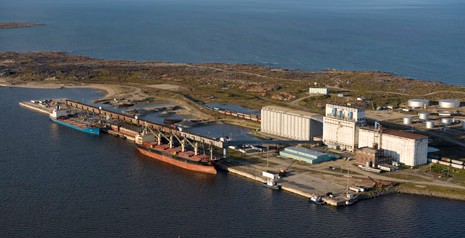Port of Churchill Sold to First Nations Group

Port of Churchill grain shipping operation on the Churchill River. Port of Churchill photo.
A First Nations group based in Northern Manitoba is in the process of buying the Port of Churchill and Hudson Bay rail line from OmniTrax, a Denver ,Colorado based company. The town known as the polar bear capital of the world has been struggling to keep the ancillary business viable in these changing times.
The First Nations group provided a letter of intent for the purchase of the port and the Hudson Bay line – the stretch of track from The Pas to Churchill – as soon as both sides complete necessary research on the transaction.The rail line is the lifeline that connects all the small communities that have no road access in the region.
“It’s a group of communities along the line and others that, you know, over the period of time have always believed the railway was theirs. This now can become a reality based on current negotiations,” said OmniTrax president Merv Tweed. With the invested interest that the group has to keep the rail line running smoothly as a means of access to their remote communities, train service there and onto Churchill should thrive for the distant future.
At this juncture of the negotiations the buying group nor the purchase price of the assets has not been specifically identified.
“They’ll make their own statement in their time,” Tweed said.
For the next 45 days OmniTrax and the First Nations group will engage in a “due diligence period in which both parties will work together to ensure that a purchase becomes a reality,” a news release from Omnitrax stated. Omnitrax has agreed to work with the First Nations group for the next several years to facilitate a smooth transition. However, given the lack of success that Omnitrax has had in managing the port and increasing the shipping quota, this new regional rooted infusion might be a time to try new strategies for building the business and attaining higher levels of success.
OmniTrax acquired and began operating the port and rail line in 1997, though a reduction in grain shipments has placed financial strain on the operation. An attempt to diversify and specifically ship oil through the port was met with voracious public outcry which inevitably killed the initiative. The operation just seemed dead in the water after that battle this past year.
All these factors combined spurred the company to announce earlier this month plans to sell the operations. A quicker than expected sale agreement and local interest in the growth of the operation has instilled high hopes for the next phase in the life of the Port of Churchill. The operation employs roughly 100 local workers.

